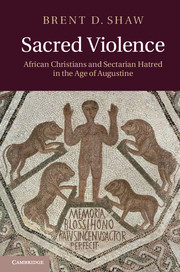Book contents
- Frontmatter
- Contents
- Abbreviations
- Maps
- Acknowledgments
- Introduction
- Chapter 1 This terrible custom
- Chapter 2 Church of the traitors
- Chapter 3 A poisonous brood of vipers
- Chapter 4 Archives of memory
- Chapter 5 The city of denial
- Chapter 6 Ravens feeding on death
- Chapter 7 Little foxes, evil women
- Chapter 8 Guardians of the people
- Chapter 9 In the house of discipline
- Chapter 10 Sing a new song
- Chapter 11 Kings of this world
- Chapter 12 We choose to stand
- Chapter 13 Athletes of death
- Chapter 14 Bad boys
- Chapter 15 Men of blood
- Chapter 16 Divine winds
- Chapter 17 So what?
- Appendix A Bishops and bishoprics in Africa: the numbers
- Appendix B Origins of the division: chronology
- Appendix C The Catholic conference of 348
- Appendix D The Edict of Unity and the Persecution of 347
- Appendix E The mission of Paul and Macarius
- Appendix F Historical fictions: interpreting the circumcellions
- Appendix G The archaeology of suicide
- Appendix H African sermons
- Bibliography
- Index
- References
Chapter 8 - Guardians of the people
Published online by Cambridge University Press: 07 September 2011
- Frontmatter
- Contents
- Abbreviations
- Maps
- Acknowledgments
- Introduction
- Chapter 1 This terrible custom
- Chapter 2 Church of the traitors
- Chapter 3 A poisonous brood of vipers
- Chapter 4 Archives of memory
- Chapter 5 The city of denial
- Chapter 6 Ravens feeding on death
- Chapter 7 Little foxes, evil women
- Chapter 8 Guardians of the people
- Chapter 9 In the house of discipline
- Chapter 10 Sing a new song
- Chapter 11 Kings of this world
- Chapter 12 We choose to stand
- Chapter 13 Athletes of death
- Chapter 14 Bad boys
- Chapter 15 Men of blood
- Chapter 16 Divine winds
- Chapter 17 So what?
- Appendix A Bishops and bishoprics in Africa: the numbers
- Appendix B Origins of the division: chronology
- Appendix C The Catholic conference of 348
- Appendix D The Edict of Unity and the Persecution of 347
- Appendix E The mission of Paul and Macarius
- Appendix F Historical fictions: interpreting the circumcellions
- Appendix G The archaeology of suicide
- Appendix H African sermons
- Bibliography
- Index
- References
Summary
The bishops who directed the affairs of each church presented themselves in public by drawing on images from humble figures of daily life. Among the Christian decorative motifs found on the utility oil lamps that provided household lighting is one such image. It is the picture of a man perched on a platform high up in a tree overlooking a grain field or an orchard. The figure is one drawn from everyday experience. He was the guardian of the cereal crops, the custos fructuum, or he was the watchman of the vineyard high up in his speculatorium vinitoris. This image of the good guardian was often evoked by bishops. In his abortive debate with Emeritus, the dissident bishop of Caesarea, Augustine defined who a bishop was: he was a man chosen by the people to lead them. Like the Lord himself, the bishop is stationed in a high lookout where he can see everything, high over the vineyards to guard the harvest. The elevated image of the lookout could be linked to the title of episcopus given to the bishop, which literally meant someone who oversees the welfare of others. In considering the term, Augustine explains:
He [i.e. the apostle Paul] kept guard; indeed he was a guard. As much as he was able, he kept watch over those over whom he was in charge. We bishops do this too. For bishops are placed in a higher position precisely so that they can keep watch and can guard their people. The word episcopus, from Greek, means one who vigilantly looks over another in Latin, an over-see-er, because a bishop “looks down” from an elevated position. Just as in a vineyard, a watchtower is provided for the worker who is responsible for the vineyard's safety, so that he can keep an eye on the field. Exactly like this, a higher place is given to bishops…we work hard to guard you…We act as your shepherds but, together with you, we are all sheep under the one shepherd. We stand in an elevated position as your teacher, but we are fellow students under the one great teacher…
The theme is elaborated again and again whenever the duties and the powers of a bishop are considered: he is a watchman, a guardian, and a lookout who protects his people and warns them about the dangers that threaten them.
- Type
- Chapter
- Information
- Sacred ViolenceAfrican Christians and Sectarian Hatred in the Age of Augustine, pp. 348 - 408Publisher: Cambridge University PressPrint publication year: 2011



